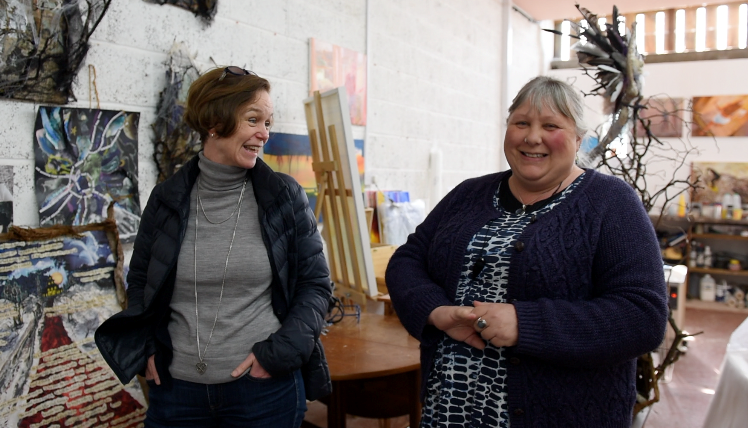
Coaching at Art Shape
Photo: Nicola Prestage, Tiger Features
Making time for future you
Making it to the top in the arts world requires confidence and clarity in your goals. If you’re lacking either, coaching sessions may help, writes Steph Vidal-Hall.
Despite diversity being high on the cultural agenda, Arts Council England (ACE) figures show that the leadership of our cultural institutions still isn’t representative of our population. So how can artists from under-represented backgrounds, whether that’s ethnicity, gender, sexual orientation, class, or mental or physical health issues or impairments, achieve their creative potential and make it to the top?
Including professional development alongside your artistic goals can show a funder how a project will help you or your organisation develop
I’ve noticed that the barriers that under-represented cultural workers and artists experience often have an impact on their confidence to follow through on their thinking. They want to manage their sickle cell condition with rest but that feels lazy; they’d like to relax at an opening but they have to be a shining example of a professional Muslim woman; or they want to loosen up their figurative style but they’re afraid it won’t sell.
These barriers drain confidence and sap energy that could be channelled into making strategic decisions about a future career, making good work and paying the rent. Having a coach to help you drive your career is easier than you imagine. If you’re dealing with barriers, coaching can dismantle internal blocks, and there’s nothing like a date in the diary to make sure time gets devoted to the serious but not urgent stuff that makes things happen.
Coaching for confidence
Coaching is led by the person being coached and provides protected time and space to focus on personal and career goals. It can help clarify what you want, how you’re going to get there, and how your own thinking might be affecting your achievements. It can help you unpick the self-imposed barriers (“I’ll look lazy if I manage my health”) and set aside time and space to think, enabling you to take the right action for you.
Coaching can transform the experience of some artists in many ways: a poet returns to performing after an eight-year hiatus; a classical musician manages a team of composers and a six-fold increase in budget; a creative producer successfully transitions from employed to freelance work; and a fine artist smashes a three-month creative block, finishes his work-in-progress and sells all his work.
Finding a coach and paying for it
So how do you find a coach? Most coaching associations, such as the Association for Coaching and the International Coach Federation hold a register of accredited coaches, while Relational Dynamics 1st specialises in the arts sector.
Some organisations provide in-house coaching. Dance Career Development provides transition coaching for dancers, while Cockpit Arts has on-site coaching for its tenants. Some ACE-funded professional development courses include coaching, as does the Clore Leadership programme.
Coaching is often part of funded professional development opportunities, but artists and organisations can also write coaching into bids. Including professional development alongside your artistic goals can show a funder how a project will help you or your organisation develop, work in new ways and contexts, and how you’ll manage the activity – areas in which applications can often be weak.
Sessions can range in cost from £50 to £150, but coaches have a sliding scale for different sectors, and funders will expect to see industry-standard rates in your budget.
Coaching for creatives
Through a grant from ACE’s Grants for the Arts programme Coaching for Creatives, a six-session coaching programme, was delivered for artists from under-represented backgrounds. This was a partnership with arts organisations in the West Midlands that had identified potential coachees, and then sponsored them for some of the costs and provided the venues.
Working in this way has economies of scale and is cost-effective. As an artist, you may be able to recruit other artists that funders find difficult to reach and want to support – enabling you to strengthen your networks, build a relationship with a venue, and access coaching for yourself.
However you approach coaching, take a look at Adaptive Resilience and benchmark yourself against Mark Robinson’s resilience factors: finance, purpose, innovation, connection, self-management, resources, reflection and environment. It gives a robust structure to developing as a creative and entrepreneur.
Steph Vidal-Hall is a Coach and Facilitator.
www.svidalhall.co.uk
Join the Discussion
You must be logged in to post a comment.